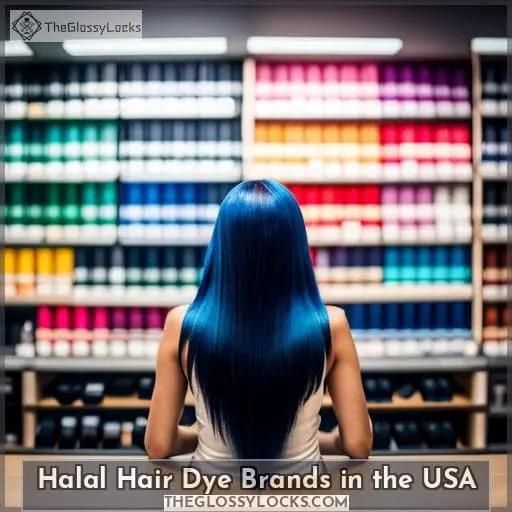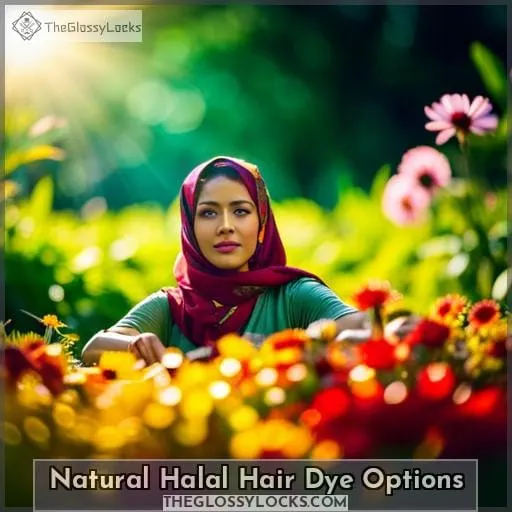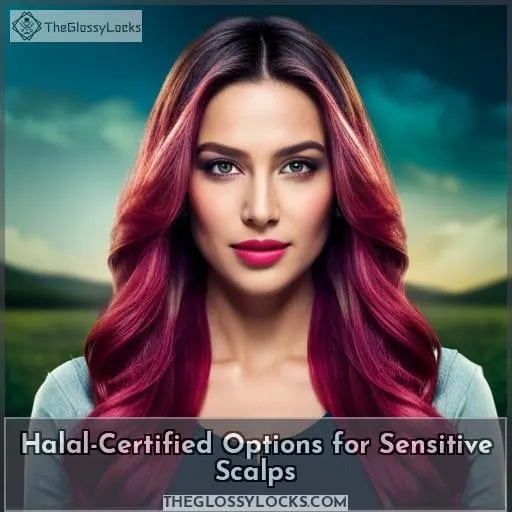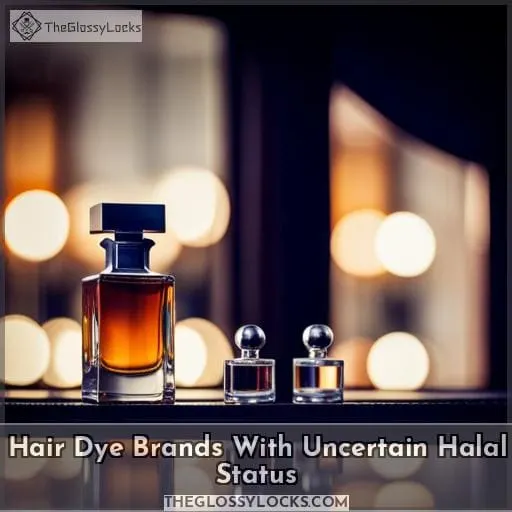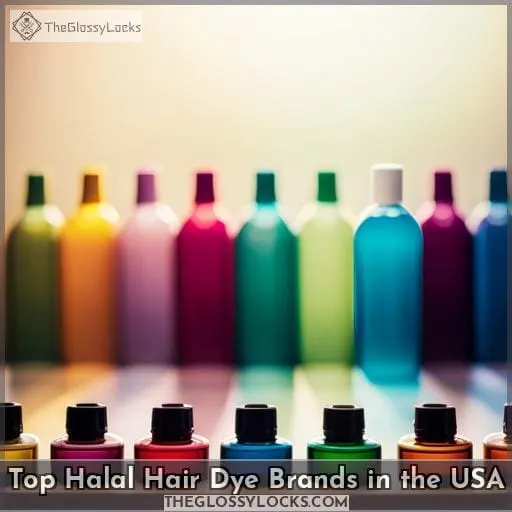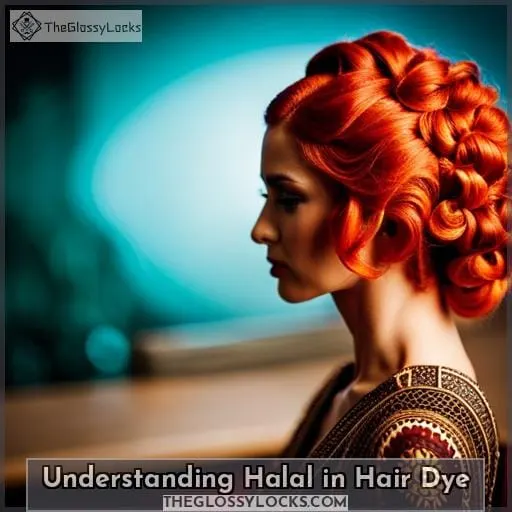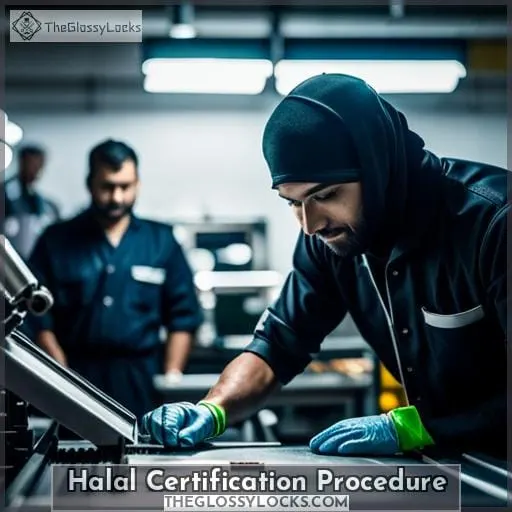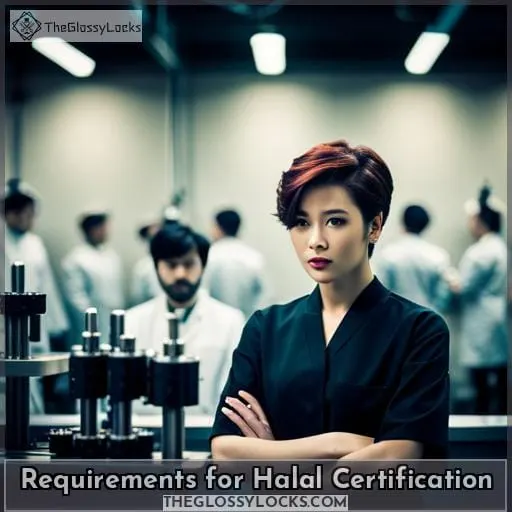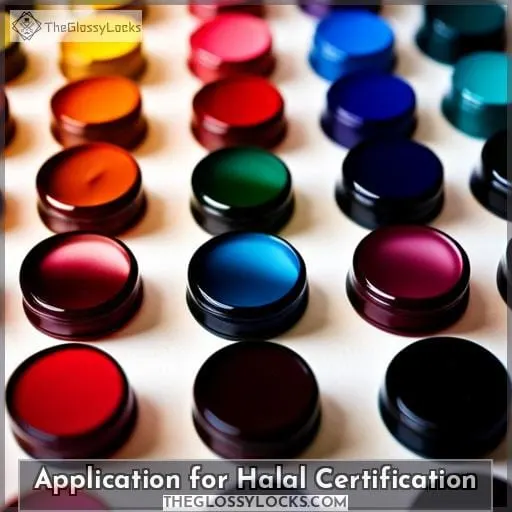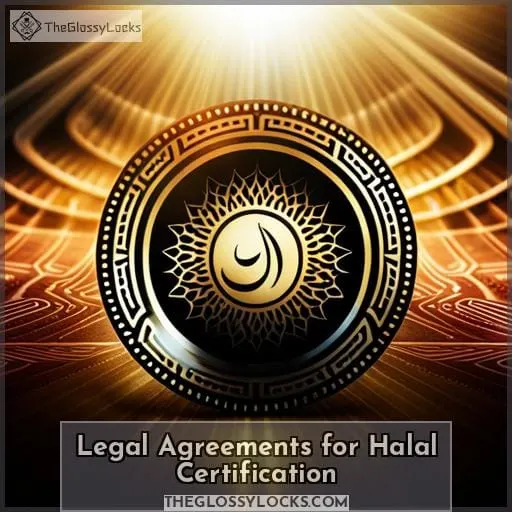This site is supported by our readers. We may earn a commission, at no cost to you, if you purchase through links.
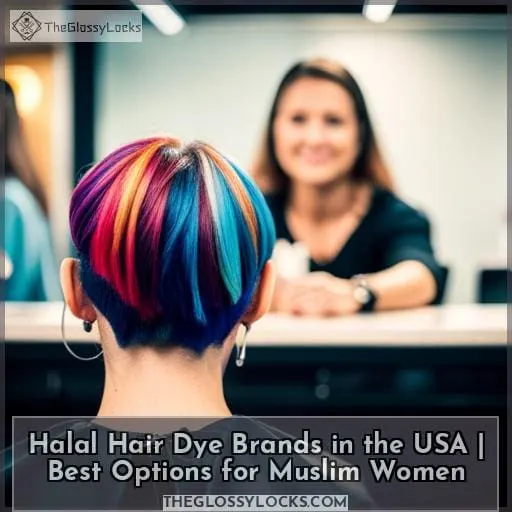
To ensure Muslim women make an informed decision when picking out their next hair color, we’ve compiled this guide outlining all the best options for finding a certified and ethically sound product.
Table Of Contents
- Key Takeaways
- Halal Hair Dye Brands in the USA
- Natural Halal Hair Dye Options
- Halal-Certified Options for Sensitive Scalps
- Hair Dye Brands With Uncertain Halal Status
- Top Halal Hair Dye Brands in the USA
- Understanding Halal in Hair Dye
- Halal Certification Procedure
- Requirements for Halal Certification
- Self-Assessment Checklist & Supportive Documents
- ECAS Application Form
- Valid Industry/Trade License
- Declaration of Conformity
- Certificate of Export or Authenticated Free Sales Certificate
- Product Composition & Ingredients Report
- Quality and Safety Management System Proof
- Test Report From Accredited ISO 17025 Lab
- Facility Map/Farm Layout
- Label Artwork and Materials Table
- Halal Certificate for Ingredients/raw Materials
- Brief Manufacturing Process Description
- Certificate of Raw Materials & Packaging
- Fees
- Application for Halal Certification
- Legal Agreements for Halal Certification
- Conclusion
Key Takeaways
- Top halal hair dye brands in the USA include Revlon, Garnier, Iba Halal, Indus Valley, Gumash, and Shurah Hair Colour.
- Natural halal hair dye options include Inika Organic, Silk & Stone, and Indigo Powder.
- Garnier, Schwarzkopf, and L’Oreal have uncertain halal status.
- Halal certification procedure includes documentation, lab tests, and facility audits.
Halal Hair Dye Brands in the USA
Are you searching for halal hair dye options in the USA? Revlon’s Colorsilk Hair Dye Range, Garnier’s Colour Naturals Cream Hair Colour, Iba Halal, Indus Valley, Gumash, and Shurah Hair Colour are some of the leading brands offering certified halal products.
These brands provide a range of natural-looking shades with nourishing ingredients suitable for sensitive scalps.
Revlon’s Colorsilk Hair Dye Range
Experience vibrant colors and nourished hair with Revlon’s Colorsilk range, certified halal for peace of mind. With 41 shades ranging from jet black to golden blonde, discover the perfect hue for your look.
Garnier’s Colour Naturals Cream Hair Colour
Try Garnier’s Colour Naturals Cream Hair Colour for a nourishing, halal-certified experience. Mary achieved beautiful results after one application! Its certification ensures that only Halal ingredients are used and safety is guaranteed.
While natural alternatives are available, consumer preferences should also be considered.
Iba Halal
Discover Iba Halal, an Indian brand offering sulfate-free, paraben-free, and alcohol-free henna hair dye. It offers natural Asian hair colors with a range of benefits such as nourishment and hydration of the scalp.
Reviews are generally positive about its effectiveness without any damage to the hair or scalp. The ingredients include natural herbs that provide a protein boost and color intensity while locking in moisture for lasting results.
Availability is limited due to its halal certification process but may be found online or through authorized distributors for customers in the USA’s Muslim community seeking alternatives to traditional brands like Garnier’s Colorsilk Hair Dye Range.
Indus Valley
You can now achieve long-lasting, vibrant color with Indus Valley’s halal-certified hair dye products that are vegan and organic. Benefits include: Halal Henna for natural coloring Sulfate-free option for sensitive scalps *Certification process to ensure compliance. Perfect for Muslim women looking to maintain wudhu-compliant hair color while also promoting inclusivity and diversity in the beauty industry. Halal cosmetics are a great way to access liberation and power!
Gumash
Experience Gumash’s halal-certified, wudhu-compliant hair dyes for natural Asian shades and red hues. All products are free from alcohol or animal derivatives, making them suitable for those looking to uphold Islamic law.
Plus, the certification process ensures inclusivity within the beauty industry while providing safe options for sensitive scalps.
Shurah Hair Colour
Marvel at Shurah Hair Colour: a halal-certified, wudhu-compliant dye from Malaysia that offers natural Asian hair colors and red shades. Enjoy its benefits like color longevity and conditioning with henna extract ingredients.
Explore the wide range of vibrant shades or apply tips from customer reviews for the best results.
Natural Halal Hair Dye Options
Are you looking for natural and halal hair dye options in the USA? Inika Organic, Silk & Stone, and Indigo Powder are some of the most popular brands offering certified halal products. All three provide a variety of shades to suit different styles without compromising on ethics or safety.
Inika Organic
Discover Inika Organic, a halal-certified and natural option for hair color that’s free from harsh chemicals. Benefits include vegan ingredients, nourishing oils, and vitamins. The certification process requires submission of a self-assessment checklist along with an application form.
Halal cosmetics promote inclusivity in the beauty industry and are not limited to Muslims. Natural hair dyes, like henna powder, can also be used for halal coloring. However, it is important to conduct proper research to ensure compliance with Quranic rules of wudhu permeability and to avoid animal-derived substances or alcohols.
Inika Organic stands out as one of the top brands offering quality products that adhere to these guidelines.
Silk & Stone
Unlock a new level of confidence with Silk & Stone’s halal-certified, natural hair dyes that are sure to turn heads. Get the benefits of henna without any harsh chemicals: nourishing color, increased shine, plus improved manageability and conditioning.
With five shades to choose from – Auburn Red Henna Hair Dye, Natural Brown Henna Hair Dye, Jet Black Henna Hair Dye, and Neutral Blonde – you’ll find just what you need for your desired look without compromising on ethics or safety!
Even those with sensitive scalps will appreciate this gentle option compared to Pure Henna or other chemical-free options like Herbatint and Tints Of Nature.
Indigo Powder
Indigo powder is a potential natural and halal alternative for hair color, offering an array of vibrant shades. It is derived from the Indigofera tinctoria plant, traditionally used in India as a hair dye since ancient times.
Benefits include chemical-free coloring with minimal scalp irritation and damage to strands compared to other dyes.
Indigo has more potent tinting properties than henna but can be combined with it for custom results when applied correctly. DIY indigo dye requires careful preparation before use. This involves mixing indigo powder with water or lemon juice until it reaches the desired consistency and adding salt for optimal staining power.
Post-dye care includes oil treatments to retain moisture in tresses while prolonging the vibrancy of the hues over time. It is recommended to do these treatments regularly, following the Quran rules of inclusive beauty products and ensuring all products used are compliant with halal certification.
This is especially important when using halal certified USA-based products like Indigo Powder.
Halal-Certified Options for Sensitive Scalps
For individuals with sensitive scalps, it is crucial to consider halal-certified hair dye options. Herbatint and Tints of Nature, which are ammonia-free dyes, offer a safe alternative for wudhu compliance while still delivering vibrant color in the USA.
Ammonia-Free Hair Dyes
For sensitive scalps, you can take a leaf out of the book of Ammonia-Free hair dyes—certified to be halal and gentle on your locks. These products are free from animal-derived ingredients and boast benefits such as longer-lasting color retention, reduced scalp irritation, and more natural-looking results.
Halal certification ensures personal beliefs are respected while promoting inclusivity within the beauty industry for diverse users. Natural alternatives like Indigo powder may also offer safe options; however, research is necessary to ensure its compliance with halal regulations before use.
With these options in mind, finding certified alternatives that suit individual needs should not be an issue!
Herbatint
Discover Herbatint, a halal-certified hair dye perfect for sensitive scalps that offers natural-looking shades with maximum coverage. Developed by herbalists in the 1980s, it contains no ammonia or parabens and is cruelty-free.
Its gentle formula provides rich color without damaging your scalp while protecting your hair from environmental damage.
The Halal certification process ensures all ingredients are safe to use and compliant with Muslim beliefs and practices.
As one of the most trusted brands offering halal beauty products, Herbatint continues to be a popular choice among those seeking organic options without compromising standards or ethics.
Tints of Nature
Try Tints of Nature, a halal-certified option for those with sensitive scalps – it’s gentle and natural hair coloring without sacrificing vibrancy! It uses plant-based ingredients, is free from ammonia and peroxide, has no animal testing or animal byproducts.
The certification renewal involves quality system implementation to ensure continued compliance. Plus, the application process is easy – brush on the dye to damp roots in sections, then comb through before rinsing off after 30 minutes.
Hair Dye Brands With Uncertain Halal Status
When searching for halal-certified hair dye options in the USA, you might come across a few brands with uncertain halal status. These include Garnier Hair Color, Schwarzkopf Hair Dye, and L’Oreal’s Hair Color Products.
While these products may not be certified by a third party as being compliant with Islamic law, they do not contain prohibited ingredients like alcohol or animal-derived substances that would otherwise make them haram according to Sharia Law.
Garnier Hair Color
Garnier’s hair color may or may not be halal-certified, so check the ingredients before you use it. Consider alternative halal options such as Ammonia-Free, Herbatint, and Tints of Nature for sensitive scalps.
Natural dyes like Inika Organic, Silk & Stone, and Indigo powder are potential natural and halal choices – just research to ensure compliance with values.
For those looking for a reliable USA brand in this area, Pure Henna, Herbatint Surya Brasil, and Lush Henna Hair Dye should be considered instead of Garnier hair color due to its uncertain Halal certification status.
Do your own evaluation based on the available information about these brands to make an informed decision that fits personal values!
Schwarzkopf Hair Dye
Uncover the mystery of Schwarzkopf hair dye – an enigma wrapped in a riddle! It is uncertain whether it meets halal standards, due to its lack of official certification. However, ingredients such as alcohol and animal-derived substances are not present in the product.
A thorough review may be necessary to determine if wudhu-compliance can be achieved during the purification process for use with Muslim women’s beauty routines. With potential benefits like long-lasting coloration and nourishment, understanding its halal status is important when looking for hair dye options in the USA that comply with Islamic law.
L’Oreal’s Hair Color Products
L’Oreal’s hair color products may not be officially halal-certified, but they don’t contain alcohol or animal-derived substances. With the growing Halal cosmetics market, L’Oreal is aware of the certification process to gain access to this lucrative industry.
To understand its status in terms of Halal beauty trends, an assessment must be made on the ingredients and legal agreements related to their products/foods.
This includes understanding what type of certificate is required for raw materials and packaging, as well as quality management systems proof for long shelf life items like hair colorants. Although there are numerous brands offering a halal option, such as Pure Henna and Herbatint, many people prefer L’oreal’s range due to its natural-looking shades.
Top Halal Hair Dye Brands in the USA
Are you searching for the top halal hair dye brands in the USA? Pure Henna, Surya Brasil, and Lush Henna Hair Dye are some of the best options available. All three offer natural ingredient-based hair dyes that meet Islamic guidelines without being tested on animals.
Pure Henna
For those seeking a natural, halal-certified solution to their hair care needs, Pure Henna has got you covered. With its vibrant range of colors and nourishing ingredients, this brand offers easy application without any ammonia or synthetic dyes.
Henna, being rich in antioxidants like vitamin C and flavonoids, can help protect against premature graying while providing shine for your locks. The variety of color options, from browns to reds, makes Pure Henna an ideal choice for anyone looking to change up their look without harsh chemicals or animal-derived products.
Furthermore, the quality assurance team conducts rigorous safety tests before releasing any product onto the market.
Surya Brasil
Revel in the vibrant colors of Surya Brasil and experience natural hair color with a certified halal seal! This brand offers benefits such as being free from ammonia, parabens, and PPD. Reviews attest to its nourishing properties due to ingredients like henna extracts for healthy-looking locks.
Colors range from golden blonde to medium brown; all are wudhu compliant. Availability is expansive across the US, so you can find it at your nearest store or online! Check it out today – you won’t regret this choice for beautiful hair dye that meets halal standards here in the USA.
Lush Henna Hair Dye
Experience the nourishing and vibrant colors of Lush Henna Hair Dye, a halal-certified option perfect for anyone looking to switch up their look. Its benefits include reduced hair damage and natural conditioning from plant extracts.
Enjoy application tips, such as mixing it overnight for best results. Lush Henna Hair Dye offers various color varieties ranging from light brown to black. Henna dye is gentler on the scalp and hair shafts compared to traditional dyes, while still providing long-lasting coverage.
What more could you ask for? Get glowing reviews when you sport your new look using Lush Henna Hair Dye!
Understanding Halal in Hair Dye
For Muslim women, understanding halal in hair dye is paramount for wudu compliance. In addition, using halal-certified products encourages inclusivity and diversity within the beauty industry. As such, it’s important to know which hair dyes are officially certified as being compliant with Islamic laws on permissible ingredients.
Importance for Muslim Women
Discover how halal hair dye can help you keep your faith alive and close to heart! Halal-certified products are essential for Muslim women as they provide religious compliance by avoiding animal-derived ingredients and ensuring water permeability during wudhu.
In an effort to promote beauty inclusivity, top halal hair dye brands in the USA offer a variety of natural and chemical options that meet all of these requirements. Pure Henna, Herbatint, Surya Brasil, and Lush Henna Hair Dye are some of the leading brands in this category.
These brands offer a range of benefits for Muslim women. Pure Henna, for example, has hair strengthening properties and provides rich color depositing capabilities.
Herbatint, on the other hand, offers a paraben-free formula and an ammonia-free formulation. Their colors are long-lasting, lasting up to 8 weeks, and they also provide 100% grey coverage.
Surya Brasil’s halal hair dye is enriched with organic extracts that are rich in vitamins E and F, providing deep nourishment to the hair strands. Their unique blend of botanical ingredients creates a gentle product that is 100% vegan.
It is also formulated without ammonia or parabens, which can cause damage or sensitivities over time.
Lush Henna Hair Dye is enriched with seaweed powder and organic hibiscus flower petals. These ingredients help lock color into the strands and provide an extra boost of hydration. The dye is wudhu compliant, making it perfectly suited for meeting all religious requirements while being kind to the skin and scalp health.
With these halal hair dye brands advocating for greater Muslim empowerment through cosmetics specifically designed with them in mind, Muslim women can enjoy the freedom of finding exactly what they need without compromising their cultural identity.
Inclusivity and Diversity in the Beauty Industry
Embrace the inclusivity and diversity of halal beauty products, allowing everyone to enjoy a safe and compliant hair care experience. Halal standards offer an impactful way for consumers to promote inclusivity — with haircare being at the forefront.
With certified options, Muslim women can choose from a variety of hair dye choices without worrying about their wudhu compliance or exposing themselves to harmful chemicals found in other dyes.
Furthermore, non-Muslims benefit too. Whether it’s due to sensitive scalps or ethical concerns about animal testing, halal certification ensures that all customers are provided with quality product choices that adhere strictly by religious guidelines as well as industry regulations.
By using these certifications when making purchases within the beauty industry, we ensure not only our own safety but also help create a more inclusive atmosphere for everyone!
Halal Certification Procedure
When seeking halal certification for hair dye, applicants must first submit a self-assessment checklist and application. An administrative review will then take place to check document availability, after which a quotation with the certification scope and fees is sent.
Following payment by the applicant, an application review takes place, including the assignment of a Conformity Officer, as well as the client signing of the Certification Agreement. Evaluation follows suit, with the conformity officer evaluating documents and product eligibility, while test reports from a third-party lab are checked.
Consequently, an approval recommendation or rejection statement is issued accordingly through a Certificate of Conformity or a rejection statement, respectively.
Submission of Self-Assessment Checklist and Application
You’ll need to submit a self-assessment checklist and application outlining your product’s compliance with halal standards. Imagine building a house: blueprints of materials and construction methods are required for approval.
Administrative Review
Once your application has been submitted, an administrative review will be conducted to ensure all documents are available. A Certification Quotation with scope and fees is sent after Halal Compliance Assessment.
The Application Evaluation includes the Conformity Officer’s product eligibility tests and 3rd party lab reports. A Facility Audit may be required before making a Certification Decision on the approval or rejection of the application.
Quotation and Payment
After submitting the required documents and completing the application, you’ll receive a quotation with the certification scope and fees for further consideration. This includes an agreement to comply with rules and standards, a schedule of fees, non-disclosure agreements for confidential information, and a certificate of conformity or rejection statement if applicable.
Payment is then made before proceeding to evaluate product eligibility via tests from third-party labs, as well as facility audits when necessary. Certification costs vary depending on the complexity of the products in terms of ingredients used or processes involved in production/manufacturing.
Halal accreditation certifies compliance according to Quranic guidelines, thus ensuring safety and quality outcomes derived from ethical practices.
Application Review and Evaluation
Once you’ve submitted your application, the Conformity Manager will assign a Conformity Officer to review your documents and product eligibility. This officer evaluates whether it meets all criteria for halal certification. They assess test reports from third-party labs to determine product safety and quality, as well as conduct facility audits when necessary.
The final decision is then made about granting or denying halal certification based on these evaluations of eligibility guidelines in the process.
Decision of Certification
Based on the evaluation of your application, a decision will be made regarding certification. The Conformity Officer assesses product eligibility according to Halal standards and compliance requirements.
Implementation of a quality system is necessary as part of the successful certification process. To ensure quality and safety, test reports from third-party labs are evaluated before an approval recommendation or rejection statement is sent to the client.
The product must meet all requirements in order for a certificate of conformity to be issued.
Requirements for Halal Certification
In order to be halal certified, applicants must submit a Self-Assessment Checklist & Supportive Documents, an ECAS Application Form with a valid Industry/Trade License, and a Declaration of Conformity.
Additionally, they need to provide a Certificate of Export or an Authenticated Free Sales Certificate. They must also include a Product Composition & Ingredients Report, along with proof of their Quality and Safety Management System.
Applicants must also present Test Reports From an Accredited ISO 17025 Lab. They should include Facility Map/Farm Layout details, such as Label Artwork and Materials Table. Furthermore, they need to provide Halal Certificates for Ingredients/raw Materials, as well as Brief Manufacturing Process Description documents, including Certificates of Raw Materials & Packaging fees.
Self-Assessment Checklist & Supportive Documents
To ensure halal certification, provide a self-assessment checklist and the necessary documents.
- Details of the certification process
- Required documents for application review
- Compliance criteria of the Halal beauty industry
ECAS Application Form
Filling out the ECAS application key to ensure that the hair dye meets the requirements for halal certification. Documentation submission, product criteria, and certification fees must be completed to meet the criteria of the Halal Product Certification Scheme.
Understanding and abiding by the rules and standards is an essential step for a successful application process and eventual certification of the product as ‘Halal’.
Valid Industry/Trade License
You’ll need to provide a valid industry/trade license for your hair dye product in order to be halal-certified. Trade licensing is crucial for the certification process, ensuring compliance with standards and recognizing the importance of business operations.
Achieving trade licensure requires meeting requirements set by governing bodies, which can vary depending on the type of product or industry. Licensing must be maintained throughout the production cycle under careful oversight in order to remain certified as halal compliant.
Declaration of Conformity
Sign the Declaration of Conformity. Ensure that your USA hair dye is halal certified. The certification process, compliance requirements, and industry standards must be met.
Certificate of Export or Authenticated Free Sales Certificate
To receive halal certification, you need to provide a Certificate of Export or an Authenticated Free Sales Certificate. It’s like obtaining the key to unlock the potential of your product. The certificate requirements include verification of authenticity and compliance with Halal product standards, which offer benefits such as market access and global recognition.
The export process outlines how goods are certified in accordance with international trade laws, ensuring credibility, safety, and quality assurance for customers worldwide.
Product Composition & Ingredients Report
You must provide a Product Composition & Ingredients Report:
- List ingredients used in the hair dye product.
- Demonstrate which ones are halal-certified/natural alternatives.
- Show available options for sensitive scalp too!
Quality and Safety Management System Proof
Demonstrating quality and safety management is required for halal certification. Quality assurance, industry requirements, and safety standards must be proven. Compliance verification in the certification process is necessary to achieve eligibility.
Verifiable documents are necessary, from product composition to facility layout/map. A brief manufacturing process description is also needed, along with raw materials/packaging certificates.
Test Report From Accredited ISO 17025 Lab
You’ll need an ISO 17025 lab report verifying halal compliance. Accredited labs, certification requirements, and product evaluation are crucial.
Facility Map/Farm Layout
To ensure halal compliance, you must provide a facility map/farm layout. This is part of the certification process to promote inclusivity and beauty industry standards. Facility mapping enables recognition and verification of compliance with halal requirements for certification.
It also ensures power, liberation, and mastery in the product’s safety and quality assurance within the industry itself. The certification process helps guarantee proper processes are followed for the promotion of diversity and inclusion across all sectors involved – from production to the consumption stage.
Label Artwork and Materials Table
Confirm label artwork and materials table. Ensure halal certification for hair coloring products:
- Label artwork must comply with standards.
- Materials should be certified halal-friendly ingredients/raw materials only, per product packaging requirements; no alcohol or animal-derived ingredients allowed!
- Quality system implementation necessary to achieve compliance 3 months before certification process begins; fees apply accordingly!
- Non-disclosure agreement signed by applicant prior to submission of self-assessment checklist and application form required for review and evaluation of documents and eligibility test reports from accredited lab.
Facility audit may be conducted if needed to ensure successful approval recommendation or rejection statement issued based on conformity officer’s observation during application evaluation stage. Certificate issuance or denial depends on overall findings from initial administrative review conducted upon receipt thereof at the outset.
Readers may now confidently move forward knowing they have all the information necessary when it comes time for them to obtain their own Halal Certification Process Approval Recommendation Statement Certificate Issuance.
This certifies that their Hair Coloring Product Packaging meets all applicable Halal Standards Requirements Regulations Guidelines Policies Procedures Criteria, etc.
Halal Certificate for Ingredients/raw Materials
Ensure a halal certificate for all ingredients and raw materials. Verify compliance with halal beauty product production standards. Ingredient verification is essential before the certification process begins. Review relevant documents and product eligibility carefully with the help of a conformity officer.
Follow Quran rules, avoid animal-derived ingredients, and ensure water permeability for wudhu purposes.
Brief Manufacturing Process Description
You need to provide a brief description of the manufacturing process for your product in order to obtain halal certification.
- Overview of steps & ingredients used:
- The manufacturing process involves several steps, starting from procurement of raw materials to the final delivery of the product.
- We ensure that all ingredients used in the production are halal and comply with the guidelines set by Sharia law.
- Verification of each ingredient’s source & safety measures taken during production:
- We carefully verify the source of each ingredient to ensure its halal status.
- Safety measures are taken throughout the production process to maintain the quality and integrity of the product.
- Quality control standards must be met throughout the entire process:
- We have implemented strict quality control measures to ensure that the product meets the highest standards of quality and safety.
- These measures include adherence to food hygiene and safety regulations, animal welfare principles, and environmental protection guidelines set by Sharia law.
The application should include details such as each step in production, raw materials and suppliers, and quality assurance procedures. It should be presented in an overview format that is easy for reviewers to understand quickly, yet comprehensive enough to include all relevant information.
In addition, you will need to provide evidence confirming compliance with these requirements at every stage, from procurement to delivery. It is also important to provide proof that no prohibited substances are included at any part of the procedure before being eligible for Halal Certification approval.
Certificate of Raw Materials & Packaging
Verify that the raw materials and packaging are halal-certified for a wudhu-compliant product. Ingredient sourcing and supply chain transparency ensure quality assurance. Traceability of raw materials and compliance with packaging are critical to success.
Transparency is key in meeting the stringent requirements for certification. Quality control must always be maintained to guarantee satisfaction with the final product.
Fees
Make sure you are aware of the fees required for halal certification before applying. Budgeting costs, application expenses, and compliance pricing should be taken into account. Research potential certification agencies and their respective budget plans to find the best fit for your product or service.
Fees can vary greatly depending on the type of product/service and scope of certification needed; plan accordingly! Consider cost comparisons between different certifying bodies to maximize value while ensuring Halal compliance standards are met.
Application for Halal Certification
When applying for Halal Certification, it is important to provide the Product Type and Certification Scheme you are seeking, as well as any Relevant Standard or Normative Documents. Additionally, General Information about the Applicant must be supplied along with Outsourced Processes Details and an Agreement to Comply With Rules and Standards.
This information will help ensure that your application process is efficient and successful.
Product Type and Certification Scheme
Determine the product type and certification scheme you need to follow for halal-certified hair color. Certification Categories: Animals, Plants, Products with a long shelf life. Application Process: ECAS form, Document Submission & Evaluation.
Legal Agreements: Certificate of Conformity & Non-Disclosure Agreement. Requirements include Quality System Implementation & Raw Material Certificates for Ingredients/Packaging used in the production process.
Relevant Standard or Normative Documents
To ensure your hair dye meets halal requirements, review the relevant standards or normative documents for compliance. ECAS’ Certification Agreement outlines specific criteria to guarantee product conformity with Quranic rules.
Understand Halal Certification Standards, Normative Guidelines, and Processes for beauty products and the Cosmetic Industry’s Standards of Compliance.
General Information About the Applicant
You need to provide comprehensive information about yourself in the application form for halal certification. This includes information such as your name, business address, contact details, and a brief description of your product or service.
Additionally, you must agree to comply with all relevant standards and regulations related to Halal compliance. By providing accurate applicant information during the certification process, you can ensure that products are carefully assessed by experts before being certified Halal-friendly, which promotes inclusivity within the beauty industry.
Outsourced Processes Details
Ensure that any outsourced processes you utilize are compliant with halal certification requirements to guarantee the quality of your product.
- Certification compliance for suppliers and subcontractors.
- Collaboration between all parties involved in production.
- Source a halal product from verified sources.
Oversight of each step in the process is essential; attention to detail helps maintain compliance throughout production while providing assurance of quality results for customers’ peace of mind. Focus on these key areas when working with an outside party during Halal certification application or renewal process!
Agreement to Comply With Rules and Standards
Agreeing to comply with the rules and standards of halal certification is key to the successful approval of hair dye. Regulatory compliance requires a Compliance Agreement, outlining adherence to Halal Standards and Certification Rules.
Achieving this agreement guarantees that products meet all criteria necessary for acceptance into the market. Complying with these regulations ensures consumers can trust in the safety and quality of their purchase, while also securing access to global markets through the recognition of halal certifications across borders.
Legal Agreements for Halal Certification
When applying for a halal certification, it’s important to review the legal agreements such as the Certification Agreement, Non-Disclosure Agreement, and Schedule of Fees – just like putting together pieces of a jigsaw puzzle.
The Certification Agreement specifies the scope and terms under which halal compliance will be achieved. This typically includes the submission of documents such as self-assessment checklists.
The Non-Disclosure agreement ensures that confidential information remains protected throughout all stages during the application assessment and evaluation process.
Lastly, applicants must submit fees based on the certification scope in accordance with the Schedule of Fees provided by certifying bodies or organizations.
It’s essential to understand these legal agreements before submitting any applications for halal certification due to their unique nature compared with other types of product certifications in the market today.
Applicants should also bear in mind that they might need regular renewal depending on the type or category chosen.
Conclusion
Finding the right halal hair dye brand in the USA can be confusing, but it doesn’t have to be. With a range of halal-certified, natural, and vegan options, Muslim women have a myriad of choices to choose from.
Revlon’s Colorsilk Hair Dye Range, Garnier’s Colour Naturals Cream Hair Colour, Iba Halal, Indus Valley, Gumash, Shurah Hair Colour, Inika Organic, Silk & Stone, and Indigo Powder are all halal-certified hair dye brands available in the USA.
For those with sensitive scalps, Ammonia-Free, Herbatint, and Tints of Nature are the best options.
Pure Henna, Surya Brasil, and Lush Henna Hair Dye are some of the top halal hair dye brands in the USA.
Despite the availability of halal hair dye brands, it is important to understand the importance of halal certification to ensure compliance with Quranic rules and promote inclusivity and diversity in the beauty industry.

